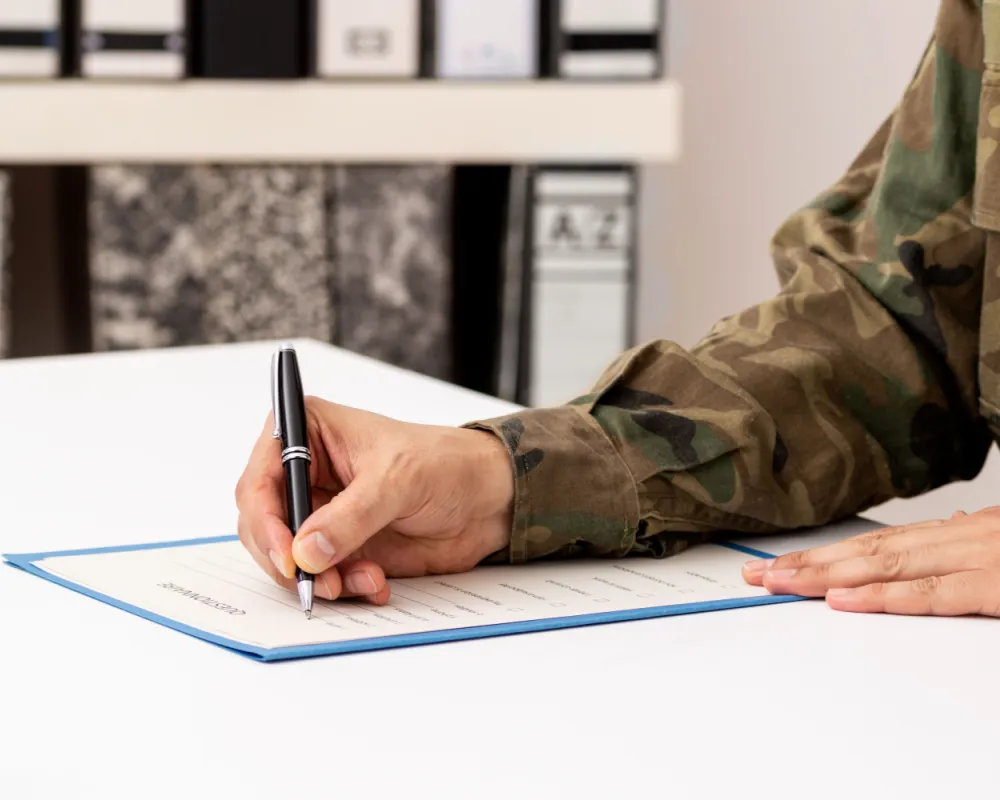TRICARE Marijuana Rehabs
TRICARE Coverage for Marijuana Addiction Treatment
If you or a loved one is struggling with marijuana use and you’re TRICARE, you’re probably wondering what kind of help is out there and how to get it.
Whether you’re active-duty military, a dependent, or a veteran receiving TRICARE benefits, knowing your options for TRICARE marijuana rehabs can be a huge relief and direction.
Substance use, including cannabis use disorder, is taken seriously in the military and the healthcare providers who serve it. TRICARE does cover substance use treatment but there are some specifics to know when it comes to marijuana.
To qualify for TRICARE coverage of marijuana addiction treatment, you must meet specific criteria set by TRICARE. Let’s break down how TRICARE works, what’s covered in a rehab setting, and how to find the right program for you and your military lifestyle.
Our guide for TriCareRehabs.com breaks down all you need to know to get the right type of support. And remember, for immediate assistance, we are only a confidential phone call away!
Is Marijuana Use a Substance Use Disorder Under TRICARE Insurance?
By using TRICARE benefits you can get a range of services tailored to your needs so you can get the help you need to overcome addiction and build a healthier future. Of course, for addiction and mental health therapeutic services to be covered under TRICARE you must qualify for this help.
Marijuana can be a tricky substance to define in terms of addiction potential and need for treatment. But there are circumstances where TRICARE drug rehab coverage will apply to marijuana treatment.
Addressing Cannabis Use Disorders in a Military Context
Marijuana may be legal or decriminalized in many states, but under federal law and Department of Defense regulations, it’s still a prohibited substance.
So, for service members and many beneficiaries, marijuana use can still have significant consequences – health, legal, and occupational risks.
Military culture contributes to substance use disorders among service members due to unique stressors and trauma experienced in service, which can lead to conditions like PTSD and substance use.
TRICARE recognizes cannabis use disorder as a diagnosable mental health condition under the DSM-5, so it’s a metaphor for you to add a touch of creativity.

Is Rehab Necessary for a Cannabis Addiction?
Not everyone who uses marijuana needs rehab. But for those who find themselves using more than intended, feeling unable to stop, or using to cope with stress, anxiety, and depression, it can become a problem worth addressing.
Cannabis use disorder can include symptoms like withdrawal, tolerance, cravings, and continued use despite harm.
If these signs are showing up in your life or in the life of a loved one, know that help is out there and recovery is possible, without judgment and with your best health in mind. Patients can get the therapeutic interventions and support services they need to recover.
What Kind of Rehab for Marijuana Use Does TRICARE Cover?
TRICARE will generally cover several types of addiction treatment services. Here’s a better idea of what kind of substance abuse treatment you may be able to get through your health insurance plan:
Levels of Care Covered by TRICARE
TRICARE insurance plans cover multiple levels of substance use treatment and mental health services. Marijuana use disorder can fall under these same categories when medically necessary. These levels include:
- Detox Services: Although marijuana detox doesn’t usually involve severe physical withdrawal symptoms, TRICARE may still cover supportive care for individuals with co-occurring disorders or complex needs during the early stages of stopping use.
- Residential/Inpatient Rehab: 24-hour inpatient care for moderate to severe substance use disorders including those co-occurring with PTSD, depression, or anxiety
- Partial Hospitalization Programs (PHP): Day treatment programs that provide intensive therapy and medical oversight while the patient goes home in the evening
- Intensive Outpatient Programs (IOP): Structured treatment programs offering group and individual therapy several days a week for those who don’t need 24/7 care
- Outpatient Counseling: Ongoing individual or group therapy sessions with a focus on relapse prevention, coping strategies, and mental health support.
What Makes a Rehab TRICARE-Approved?

To get coverage you’ll need to go to a treatment center that is TRICARE-authorized. This means the facility has been credentialed and contracted to provide covered services to TRICARE beneficiaries. Drug and alcohol rehab facilities must meet specific criteria to be TRICARE-authorized so they provide quality care and adhere to established standards.
The best way to find out if a program accepts TRICARE is to contact a Tricare Rehabs representative. We can help you find an in-network provider under your specific TRICARE plan, such as TRICARE Prime, Select, or TRICARE for Life. We can also help you find approved treatment options in your area or nationwide.
How to Get Started With TRICARE Marijuana Rehab
The Referral and Authorization Process
Getting treatment through TRICARE usually starts with a visit to your primary care provider or a mental health professional. They’ll evaluate your situation and if needed, submit a referral for further care. Depending on your plan, prior authorization may be required for certain types of treatment, especially inpatient or residential services.
To apply for a referral and authorization through TRICARE, contact your admissions team to understand how to use your benefits and what’s covered. They can help you clarify the process and get the necessary support.
If you’re in TRICARE Prime you’ll usually need to go through your Primary Care Manager (PCM). If you’re in TRICARE Select you may have more flexibility in choosing your provider but it’s still important to confirm coverage before starting treatment.
What to Expect During Admission
Once patients have chosen a facility and confirmed coverage the rehab will usually conduct an intake assessment to determine the level of care. This assessment covers your medical history, substance use patterns, mental health concerns, and treatment goals.
Going through this assessment allows your treatment provider to understand the full context of your situation. In doing so, they are able to create a customized treatment plan that addresses each of your unique care needs and recovery goals.
If you’re on active duty the rehab will coordinate with military command as appropriate and ensure confidentiality is maintained to the extent possible under TRICARE guidelines.

Addressing Concerns About Confidentiality and Military Career Impact
Will Seeking Marijuana Treatment Affect My Career?
This is a common concern for service members considering rehab. The answer depends on your job, rank, and whether your use has already impacted your duties. Voluntary treatment sought through TRICARE is generally viewed more favorably than being caught through disciplinary measures.
TRICARE connects a network of medical services within the military health system, providing both military and civilian healthcare resources to serve active duty and retired personnel, which can impact career considerations.
Getting help early, before failing a drug test or being under the influence of marijuana on duty, may even protect your career and improve your readiness.
However, active-duty members should talk to our caring team to understand their specific rights and obligations when entering rehab.
TRICARE and Confidentiality Protections
TRICARE providers are bound by HIPAA, which protects your personal health information. However, for active-duty members, certain situations may require some level of command involvement. The criteria under which confidentiality may be breached for active-duty members typically involve scenarios where there is a risk to the mission, safety, or security.
Civilian beneficiaries, including spouses, dependents, and retirees, have more protections around privacy. It’s worth asking the provider about confidentiality policies upfront so you feel safe and informed going into treatment.
The Role of Family Support in Marijuana Rehab

TRICARE Services for Loved Ones
At TriCareRehabs.com, we understand that addiction affects more than just the person struggling: it affects families, spouses, and children too.
TRICARE offers family counseling and support services as part of substance use treatment. Many rehabs also provide education and therapy sessions for loved ones to better understand marijuana addiction and how to create a supportive home environment.
TRICARE’s comprehensive support extends to family members so they have access to a wide array of healthcare resources in both military and civilian settings. This kind of involvement not only aids the healing process but also helps prevent relapse and builds stronger relationships.
Helping a Veteran or Dependent Get Help
If you’re the spouse or parent of someone covered by TRICARE who is using marijuana to cope, it can be hard to know how to intervene. Start by having a compassionate conversation, free of judgment or ultimatums. Encourage them to talk to our experts at TriCareRehabs.com, and check if they’re open to a confidential evaluation.
Offer to help with logistics, like making the call to a TRICARE-approved facility or attending a session together, that can make all the difference. The Department of Veterans Affairs plays a big role in supporting veterans seeking help for substance use, providing accessible treatment options tailored to their unique needs.
Life After Rehab for Cannabis: What’s Next?
Continued Care Through TRICARE Insurance Benefits
Recovery from marijuana use doesn’t end when treatment does. Ongoing care is key to staying sober and mentally healthy. TRICARE covers a range of aftercare services, including outpatient therapy, medication management, and relapse prevention support.
The duration of these aftercare services covered by TRICARE can vary based on individual needs and specific plans. Many individuals also benefit from support groups, recovery coaching, or holistic therapies like mindfulness and stress reduction.
Staying connected to care, even if just monthly, can make all the difference in maintaining progress.
Building a New Normal Without Marijuana
Many people in recovery from cannabis use find that life without relying on a substance can actually feel more grounded and fulfilling. With the right tools, support, and a treatment plan tailored to your needs, it’s possible to rebuild confidence, emotional stability, and a clear sense of purpose.
Many people have been successfully treated and experienced positive outcomes and transformative effects from the compassionate care and support provided by the staff.
Whether you’re returning to service, continuing civilian life, or rebuilding family trust, rehab can be the first step towards a better, brighter path.
Get Help with TRICARE Insurance for Marijuana Abuse Treatment
Whether you’re active-duty, retired, or a family member, struggling with marijuana use doesn’t have to mean struggling alone. TRICARE does provide access to compassionate, evidence-based rehab options for cannabis use disorder, and there are treatment centers that truly understand the military experience.
These TRICARE-approved facilities cater to the unique needs of military members and their families, providing personalized support to enhance recovery outcomes.
The hardest part is often making the call for support, but once you do, you’ll find support, not shame. Recovery is possible, and with TRICARE by your side, so is a return to health, balance, and stability.
Find TRICARE-Covered Marijuana Rehabs Today
If you or a loved one needs help with marijuana use and you’re TRICARE eligible, call now. Our team has experience in TRICARE-approved care for substance use and mental health conditions, including programs for military families.
Call today for a free consultation and find out how we can help you heal—step by step, with dignity and support. Our admissions team will help you understand how to use your TRICARE benefits and what’s covered.
All calls are confidential, so please reach out now to get in-network programs and support options.
- Is There a National Guard Substance Abuse Program? - December 29, 2025
- Marine Corps Substance Abuse Program Guidance - December 8, 2025
- Does Spice Show Up on a Military Drug Test? - December 2, 2025